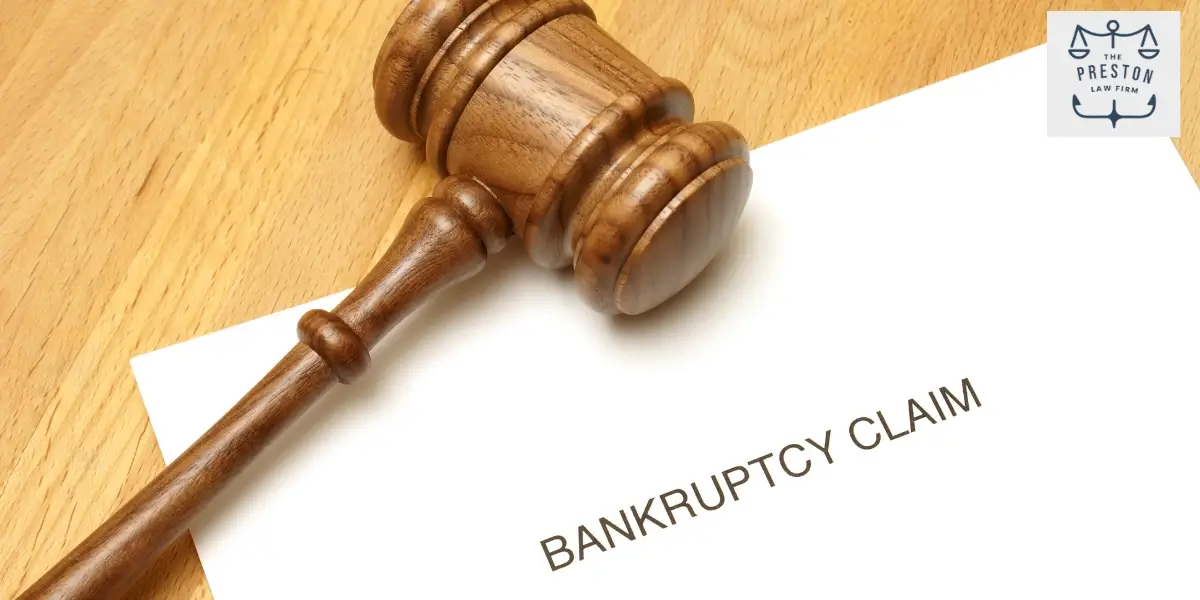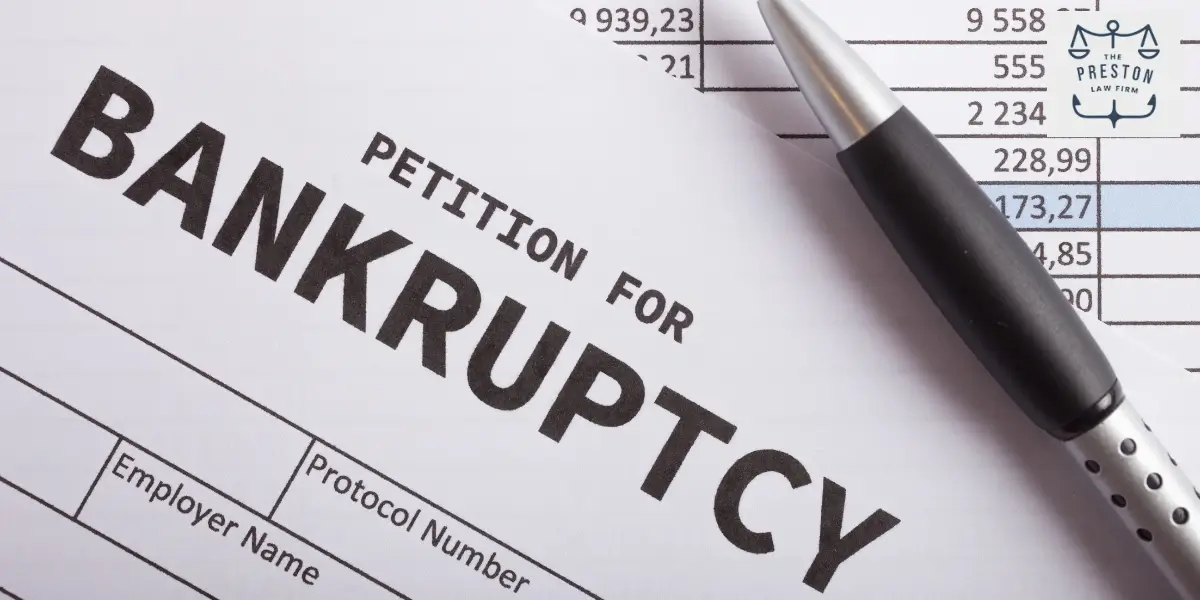Bankruptcy attorney fees in Florida will vary based on the attorney’s experience in bankruptcy cases and the complexity of your case. Attorney fees also depend on where the firm is located and the firm’s own unique policies for charging clients. The type of bankruptcy also matters, as certain types take longer and require more resources. Always discuss fees upfront with a potential attorney, including the responsibility for a bankruptcy filing fee.
Edgewater Bankruptcy Lawyer
Edgewater Bankruptcy Attorney
Difficulty paying debts can be frustrating, overwhelming, and isolating, but you are not alone. Many people are struggling with the same issues. However, there is hope. Discover whether bankruptcy is the right option for you in managing your debt. Talk with an Edgewater bankruptcy lawyer today to determine if you meet the qualifications to file and let’s help you begin with a fresh start.

Hire a Bankruptcy Lawyer
At The Preston Law Firm, we have more than 35 years of legal experience, including many years of work helping individuals file for bankruptcy. Our firm focuses on areas of law that allow us to help individuals and families navigate difficult places in their lives with skilled and compassionate legal care.
Our attorneys can help you with each step of the bankruptcy filing process, from determining which type is right for you to mapping out your plan for your financial future and stability. You don’t have to struggle with debt alone. The Preston Law Firm can provide you with the resources and information you need to begin the process and have a new start.
Understanding Bankruptcy in Edgewater, FL
Edgewater, Florida, is a scenic riverfront community along the Indian River known for its small-town charm, abundant outdoor recreation, thriving boat manufacturing industry, and strategic location near major transportation hubs and Florida attractions.
With a population of 23,314 as of 2023, many Edgewater residents work in sales, construction, and office administration. As hard as it can be to face less-than-ideal financial situations, it’s common for people to have mounting debt or unpaid bills that make daily life a struggle.
Filing bankruptcy is a right you have under federal law that helps you regain control of your finances. Unexpected expenses like divorce or medical bills can quickly create overwhelming debt. Bankruptcy allows individuals to temporarily pause collection on their debts by creditors. It provides other methods for settling that debt under federal law or gives individuals the breathing room they need to restructure financial issues until they can address those debts themselves.
Types of Bankruptcy Available to Individuals
For individuals, Chapter 7 and Chapter 13 bankruptcy are the most common options:
- Chapter 7 bankruptcy, or liquidation bankruptcy, enables a faster debt relief process by liquidating assets to pay back creditors, followed by discharging the remaining debts. This may enable you to remove debt from medical bills or credit cards.
- Chapter 13 bankruptcy, or reorganization or adjustment bankruptcy, allows you to retain your assets and repay debts over a specific period of time over several years with your income. After this period of repayment, the remaining debt is discharged.
Chapter 11 bankruptcy, which also allows for reorganization, may also be an option that’s right for you if you own a small business or have significant debt.
Not everyone qualifies for these different types of bankruptcies, however. It’s important to hire a bankruptcy lawyer so they can help you determine which is the right option for you. They can review your finances and determine the ideal method for resolving your debts.
Qualifying for Chapter 7 Bankruptcy in Edgewater, FL
To qualify for a Chapter 7 bankruptcy as an individual in Edgewater, FL, the court will compare your individual monthly income to your state’s median income. In Florida, in mid-2024, the median income was:
- $62,973 for single-earner households
- $77,639 for two-person households
- $89,908 for three-person households
If your income is below the state median, then you could qualify for Chapter 7 bankruptcy. If your income is above the median, you might still qualify if you must pass a means test. This means test attempts to prevent abuse of Chapter 7 bankruptcy.
To qualify under special circumstances, you must prove you are not abusing the filing system. Our team can review your financial circumstances to determine whether you will likely qualify and help you prepare your request for relief under Chapter 7.


The Preston Law Firm
Experience the Difference. Choose an Estate Planning Law
Firm Dedicated to You and Your Family.
Qualifying for Chapter 13 Bankruptcy in Edgewater
You may qualify for Chapter 13 bankruptcy if your secured debt is under $1,395,875 and your unsecured debt is under $465,275. The court will look at your income and expenses, as well as the regularity of your income. Because the Chapter 13 bankruptcy relies on paying back debts using your income, you cannot qualify if you don’t have a regular source of income.
Chapter 13 bankruptcy will also look at your income compared to the state median for different reasons. If your income is less than the median, then the plan for debt repayment will be for a period of three years unless there are exceptional circumstances. If your income is greater than the median, then the repayment plan will be for five years. No repayment plan will be longer than five years.
Court-Ordered Automatic Stay After Filing for Bankruptcy
Before filing, the person must complete a credit counseling course from an approved agency. Filing for bankruptcy in Florida begins when a person submits a legal document called a petition. This creates a bankruptcy estate, which temporarily takes legal control of everything the person owns at that time.
Filing for bankruptcy triggers an automatic stay, which immediately stops creditors from pursuing collection actions. This is very beneficial for individuals who have been continually hounded by creditors and haven’t had a chance to work out repayment plans.
Shortly after the filing, the court sends out a notice to everyone involved. This notice includes important details like the case number, the name of the trustee assigned to oversee the case, and the date of the required meeting with creditors, which is called the 341 meeting. The person who filed for bankruptcy must attend the 341 meeting and answer questions under oath.
During the process of bankruptcy, the court will decide how much each creditor gets paid using your assets or income under the bankruptcy plan. This may include discharging some debts owed to certain creditors, meaning you won’t have to repay them.
The automatic stay affects property repossession, wage garnishment, bank levies, foreclosure, and certain other forms of collection actions. However, this stay is not permanent, and creditors can also file to avoid the prevention of collection. An attorney can help you know how likely this will be.
Some collection activities are not affected by automatic stay, however, such as child support payments, tax audits and assessments, and claims that are not against the estate filing for bankruptcy. Your attorney can look over all your debts to understand what will and won’t be affected by the stay, so you won’t be surprised as you begin the process of bankruptcy.
How Does a Bankruptcy Attorney Help Me?
If you are considering bankruptcy, the financial strain may make the idea of hiring an attorney hard to fathom. However, working with an experienced bankruptcy lawyer can help you avoid damaging and potentially costly mistakes during the filing process.
As of 2023, 89.5% of Edgewater residents owned their homes, and the average home value was $238,700. Buying a home is a huge accomplishment. To protect your most cherished assets, it may be time to face your finances and seek additional help. You deserve to have someone on your side during this difficult time.
By discussing financial concerns with your future attorney, you can understand the costs of filing upfront. Some bankruptcy attorneys charge a flat fee to help clients feel more certain of the costs they will face. Although lawyer costs can be significant, it’s important to understand that bankruptcy is a complex legal process that you want to complete correctly. An attorney helps you protect your rights and financial interests and select the right form of bankruptcy for you.
The Benefits of Filing for Bankruptcy
Filing for bankruptcy can be a smart step toward getting your finances back on track. While many people spend years avoiding the painful reality of their financial situation, usually due to shame or embarrassment, it doesn’t make debts go away. Being able to reclaim your financial well-being can make your future brighter.
One of the biggest benefits is that bankruptcy can stop debt collectors from calling, suing, or garnishing your wages right away through the automatic stay. This gives you breathing room to figure things out.
Bankruptcy can also wipe out many types of debt, depending on the type you file. These debts can include:
- Credit cards
- Medical bills
- Personal loans
Bankruptcy ultimately gives you a fresh financial start. It may affect your credit at first, but for many people, it’s the first step toward rebuilding their credit and feeling financially free again.
You may also be able to keep important property, like your home or car. With help from a knowledgeable bankruptcy attorney, you can understand your rights, protect your assets, and make a plan to move forward with less stress.
Why Choose Us?
At The Preston Law Firm, we understand that financial hardship can happen to anyone. Since 1986, we’ve helped clients across Florida find a path forward with the respect and empathy they deserve. We understand how overwhelming bankruptcy can be for our clients, which is why we strive to make the legal process as easy as possible.
Consultations can be scheduled in person, over the phone, or via Zoom. Once your case begins, we use a secure online system to keep you updated and make communication and document sharing simple and convenient.

FAQs:
Contact The Preston Law Firm to Review Your Options
Bankruptcy can feel like a big step, but it may be the right option to give you a new start and provide you and your family with financial stability. Contact The Preston Law Firm today and see how we can help you navigate settling your debt.
THE PRESTON LAW FIRM
If you find yourself in this or another similar situation, the Preston Law Firm has the knowledge and experience to assist you. Timing is critical, CLICK HERE to contact us today.


